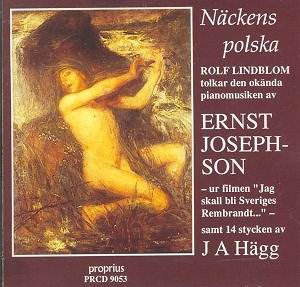These
well behaved piano stool miniatures have no pretensions to do
anything other than to delight and not unduly to stir deeper emotional
waters. Their compass is set by Chopin, Schumann and Macdowell.
The Swedish countryside, its strands and waters are the inspiration.
Convention is not challenged neither would rebellion have crossed
the minds of these two composers. Although two composers are represented
I detected hardly any difference in the language. Josephson is
if anything the more classically inclined of the two with a propensity
for charm drawn from the piano sonatas of Mozart and Haydn. Then
again in Humoresk (tr. 23) he veers towards the Chopin
waltzes. Hägg is more disposed to reach towards the psychological
subtleties and capture elusive moods. I would not exactly call
his music impressionistic but certainly it is closer to that style
than to the classical era's constraints of poise and emotion.
The
thirteen Josephson pieces (distinguished by a bullet point against
each title in the listing on the back of the booklet) seem to
be the raison d'être for the disc which is linked
to a film 'Jag skall bli Sveriges Rembrandt'. The Hägg pieces
have been added because of their mood-kinship and because so far
as I can make out from the notes (I am not a Swedish speaker),
the two composers were friends.
The
notes are only in Swedish and before we begin complaining the
Proprius discs do not seem to be marketed terribly energetically
outside Sweden. There are other languages apart from the all-conquering
English in its various moods, social subsets (texting!) and dialects.
I see no reason why the Swedish should not choose to prepare discs
for their own market in the confidence of their own culture. If
we choose to pass them by now that we have easy internet access
to them then that is our loss. Certainly if you have chased down
all those Macdowell/Barbagallo discs on Naxos American Classics
you will want this as well. This should also be a natural for
you if you liked the two Australian collections by such luminaries
as Roy Agnew, Lindley Evans, Frank Hutchens, Alfred and Mirrie
Hill and Miriam Hyde (Tamara Anna Cislowska, piano, Artworks AW005
and AW023).
Innocently
gentle and sometimes genteel piano genre pieces from Sweden's
pre-Great War world.
Rob Barnett
